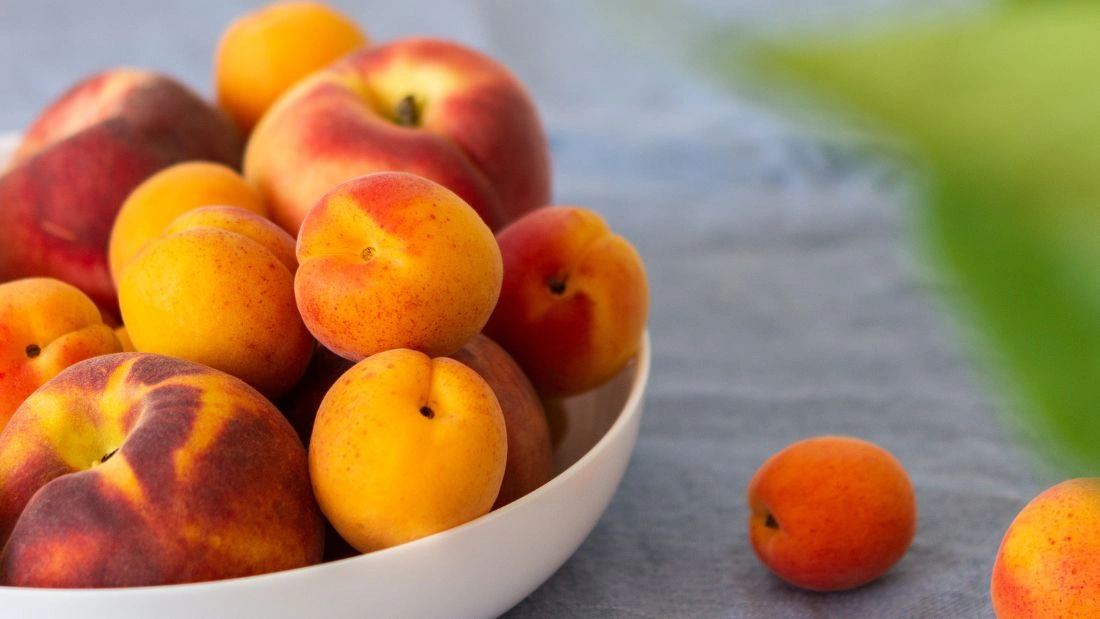Boost your health with apricots, peaches and nectarines

Sunny fruits that do wonders for your health
Peaches and nectarines are the same botanical species while apricots are their close relatives.
Apricot nutrients
As their colour suggests, apricots are rich in pigments called carotenoids, in particular beta-carotene, which is converted by your body into vitamin A. We need vitamin A for healthy skin, immune system and vision. Carotenoids are also antioxidants and help protect your cells and DNA from damage.
Apricots also pack a healthy amount of vitamin C and small doses of B group vitamins as well as vitamins E and K – vital for healthy skin, immune system, bones and blood clotting. When it comes to minerals, apricots contain modest amounts of calcium, magnesium and iron and as these minerals are much more concentrated in dried apricots, they are a very nutritious snack.
Just three apricots contain two grams of fibre and 1.5 grams of protein. The fibre content means their natural sugars are absorbed more slowly, providing healthy energy, but also feeding the good gut bacteria which support your digestive and immune systems.
Apricot health benefits
Apricots are great sources of antioxidants (which attack damaging free radical molecules) and not just carotenoids but also polyphenols. As well as protecting your body from everyday damage, they also reduce your risk of cancer, heart disease and age-related health issues.
Carotenoids are particularly important in protecting your eyes and reducing the risk of age-related macular degeneration. Some scientific data also suggest that one of the carotenoids, lutein, supports cognitive function in the elderly.
Organic apricots contain more antioxidants than conventional ones and the same applies to dried fruit. In tests comparing both carotenoids and polyphenols in organic and non-organic apricots, the organic ones came out on top!
Apricots are not only rich in fibre and antioxidants, they also contain the sugar sorbitol and this combination helps to keep your gut movements regular and may have a positive effect on your gut bacteria and gut health.
How to use apricots?
There’s no denying that apricots are best enjoyed fresh and on their own but they are also excellent blended in smoothies, chopped in cereal, salad or salsa, sliced on pancakes and halved on sweet bakes.
Dried apricots are a superb year-round staple, providing healthy energy, iron, fibre and antioxidants – perfect for snack or as an ingredient in cereals, flapjacks and cakes.
Peach and nectarine nutrients
Peaches and nectarines are the same species, the only difference being the gene that gives peaches fuzzy hair – nectarines are just hairless peaches.
One of their top nutrients is vitamin C – crucial for tissue repair, healthy skin and the immune system. Just one medium peach or nectarine supplies about a quarter of the recommended daily dose of this vitamin.
Like apricots, peaches and nectarines are rich in carotenoids, including beta-carotene, and so help you cover your daily vitamin A needs. They contain a little less than apricots but are still great sources.
Peaches and nectarines also contribute nicely to your vitamin E intake but because it’s a fat-soluble vitamin, you’d need to eat your fruit with a little fat, such as nut butter, to allow your body to absorb it. Vitamin E is an important antioxidant and its main function is in protecting cell membranes from oxidation and damage caused by free radicals. It keeps our organs and blood vessels in good condition and is essential for healthy skin and immune system.
In addition to that, peaches and nectarines boost your vitamin K intake and offer small amounts of iron, calcium, potassium and magnesium.
Of course, these fruits also contain natural sugars along with healthy fibre, which offers the same benefits as in apricots.
All varieties and shapes of peaches and nectarines, including flat or doughnut ones, have a similar nutrient content.
Peach and nectarine health benefits
Both fruits are bursting with antioxidants that help protect your body from everyday damage caused by free radicals and also reduce your risk of cancer, heart disease and age-related vision deterioration. What’s more, some of the antioxidants help keep your skin healthy and supple!
According to some research, peaches may be able to reduce allergic reactions in some people. During an allergic reaction, a substance called histamine is released in response to a trigger and it causes symptoms such as sneezing, coughing or crying. Peaches may help reduce the histamine release in the first place.
However, if you have birch pollen allergy, you may also be allergic or sensitive to peaches and nectarines because the protein in birch pollen is similar to the protein in peaches. Symptoms include an itchy mouth or throat or swelling of the lips, mouth, tongue or throat.
How to use peaches and nectarines?
Fresh peaches and nectarines make a superb snack or smoothie ingredient but they work just as well in salads, finely diced in salsas, or sliced on top of cakes. If you want to enjoy them out of their main season, dice and freeze them to add to your morning cereal or smoothies whenever you fancy.
Dried peaches are not only delicious they are also a good source of iron, with just four halves providing 10-20 per cent of your daily iron requirement. If you get a chance to buy dried, unsweetened peaches, treat yourself to this lovely snack!




